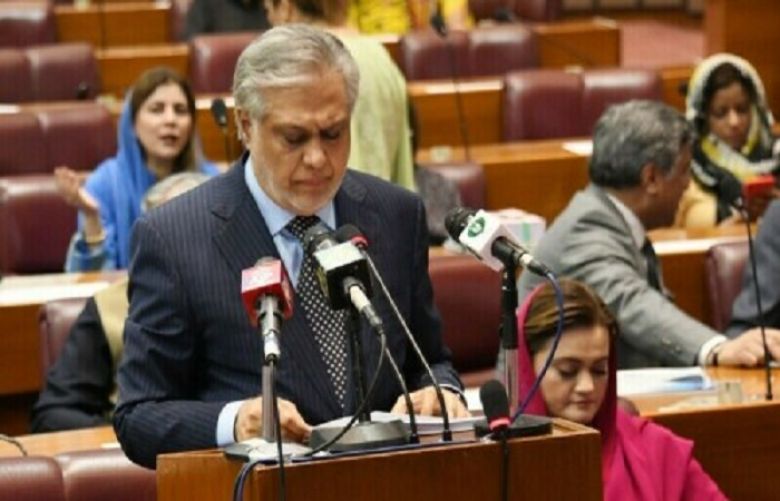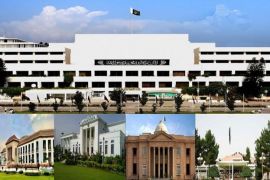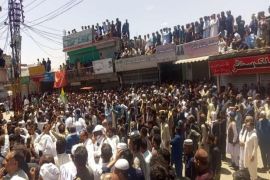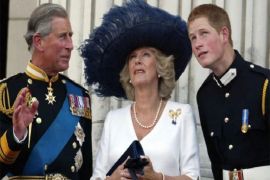The budget for the new fiscal year sailed through the National Assembly (NA) on Sunday, a day after the government made several changes, including fiscal tightening measures, dictated by the International Monetary Fund (IMF) in a last-ditch effort to secure critical funding.
The budget was passed during a session that lacked quorum, with only 70 lawmakers on the treasury benches and two on the opposition benches. Foreign Minister Bilawal Bhutto-Zardari, his father Asif Ali Zardari and the leader of the opposition, Raja Riaz, were also absent.
At the outset of the session, Finance Minister Ishaq Dar had defended the government’s move to implement various reforms in the pensions scheme.
He said that when a pensioner died, their widowed spouse would receive the stipend. But once the spouse died, their dependents would get the pension for 10 years after which it will end, he said.
“Our pension bill went to Rs800bn in this budget. It is a huge amount. It used to be half a few years ago,” Dar said, adding that these reforms were the need of the time.
During the session, Jamaat-i-Islami lawmaker Maulana Abdul Akbar Chitrali moved a resolution to send the budget to the Council of Islamic Ideology (CII). He contended that the budget was based on a “system of interest”, adding that by accepting it the government was going against the directives of the Federal Shariat Court (FSC).
“Not taking the CII’s opinion on the finance bill will be a violation of the FSC’s decision,” he said.
Ayaz Sadiq opposed the move, saying that parliamentarians had to go for Haj and called for wrapping up budget proceedings. The NA speaker put the resolution up for vote after which the the resolution was rejected.
The finance minister then presented the budget for the new fiscal year with amendments for clause by clause approval. Chitrali’s proposed amendment was also accepted, under which the chairman of standing committees would be allowed cars up to 1,200cc.
The budget envisages the federal Public Sector Development Programme (PSDP) worth 1150 billion rupees, which is the highest ever in terms of its size, reflecting the government's commitment to improve people’s standard of living.
The economic growth of 3.5 has been targeted for the next fiscal year. The revenue collection target of FBR has been revised up to 9.415 trillion rupees.
The budget encompasses special initiatives for the uplift of agriculture, industries, and IT sectors, besides, relief for various segments of society including the salaried class. Agriculture credit limit has been enhanced from 1800 billion rupees to 2,250 billion rupees. Thirty billion rupees have been earmarked for shifting fifty thousand agriculture tube wells to solar energy. He said all taxes and duties on import of quality seeds have been abolished.
Under the budget, the IT and IT-enabled service providers have been allowed to import software and hardware equal to one percent of their exports without any tax. The limit of these imports will be fifty thousand dollars annually.
Ten billion rupees have been earmarked for the Prime Minister’s Youth Business and Agriculture Loans scheme.
The budget also includes 35 percent ad-hoc relief allowance for the employees of grade 1 to 16, while 30 percent ad hoc relief for the employees of scale 17 and above. The pension has been increased by 17.50 percent. The minimum wage has been increased to 32000 rupees from 25000 rupees.
Besides, 1804 billion rupees have been set aside for defence affairs and services.
Under the changes in the budget, the government now aims to generate another Rs215 billion in taxes and cut spending by Rs85bn in the next fiscal year, without reducing the federal development budget or the salaries and pensions of government employees.
This will revise the government’s revenue collection target to Rs9.415 trillion and put total spending at Rs14.48tr. The share of the provinces would be increased to Rs5.39tr from Rs5.28tr.
The allocation for the Benazir Income Support Programme has also been revised from Rs450bn to Rs466bn for FY24. Besides, the petroleum development levy will be raised from Rs50 to Rs60 per litre.
The changes in the budget came a day after Prime Minister Shehbaz Sharif met IMF Managing Director Kristalina Georgieva on the sidelines of the Global Financing Summit in Paris.







